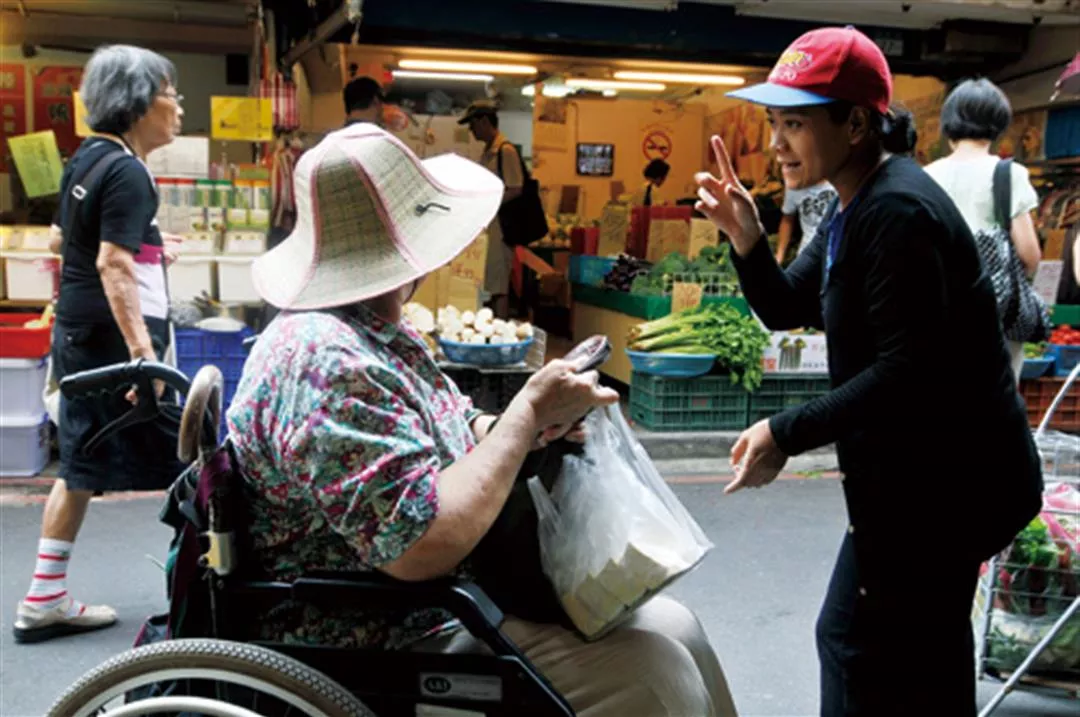Diagnosis trumps Barthel
In 2006, the CLA amended its standards, making the Barthel Index a secondary factor in deciding whether to permit the hiring of a foreign caregiver. The amended standards also included a newly added list of over 10 conditions-including severe joint problems, cerebrovascular diseases (as well as brain injuries and cerebral palsy), and dementia-that constitute automatic qualification (even when the Barthel Index score is over 30) to hire a foreign care-giver so long as a doctor's diagnosis (corroborated by a second opinion from another doctor or a physical therapist) indicates that the sufferer requires 24-hour care.
Tsai laments that, even though policies on the hiring of foreign caregivers are gradually being relaxed, a crush of demand is nevertheless leading to gaming of the system. Shady labor brokers and desperate customers, for example, have been charged by prosecutors for producing fake Barthel Index certificates.
The general public has a different lament-families dealing with the burden of long-term care say they are skirting the law only because they are forced to. The government isn't providing enough long-term care resources, policies are not keeping pace with real-life realities, and government agencies are not acting in a coordinated manner. That is why, they say, people are turning to low-paid, hardworking foreign caregivers.
Foreign caregivers
Some labor brokers ask why Taiwan does not take the same path followed in Hong Kong and Singapore, which place no restrictions at all on importing foreign caregivers. Hong Kong, for example, has only one-quarter of Taiwan's population, yet has 300,000 foreign caregivers, versus 180,000 in Taiwan.
CLA statistics show that the number of foreign caregivers has risen by about 8,000 in each of the past five years, and now stands at 180,000. In the manufacturing sector, where Taiwanese companies have been offshoring operations for some time now, the number of foreign laborers has dropped from roughly 220,000 in the year 2000 to about 177,000 today (Fig. 1).
Based on the rate at which Taiwan's population is aging, the Council for Economic Planning and Development (CEPD) estimates that persons aged 65 or older will account for 14% (3.22 million) of the total population by 2017, thus qualifying Taiwan as an "aged society," and that by 2025 Taiwan will have become a "very aged society" (with 20% of the total population aged 65 or older). The severity of Taiwan's aging is worrisome.
But just because the number of old folks is rising, does it necessarily follow that the number of foreign caregivers must also increase? The problem is clearly not amenable to such an easy solution.
From Da'an Forest Park in Taipei all the way south to the streets and lanes of Ping-tung County, senior citizens are everywhere to be seen out for a stroll in their wheelchairs, pushed along by hired help from the Philippines or Indonesia. Young foreign caregivers play a big role today in the Taiwanese family, but our society's distorted values have given rise to many complications.
Scofflaw labor brokers have been known to confiscate passports and withhold wages. Employers often exploit care-givers, and even abuse or injure them. The paucity of protection for the interests of foreign caregivers has elicited strong criticism from human rights groups at home and abroad. Isolated, overworked, and emotionally distraught foreign laborers, for their part, are also prone to break down and hurt others.
Noted author Liu Hsia suffered from the age of 12 with the pain of swollen and disfigured feet caused by atrophic arthritis, and for many years was cared for by Vi-nar-sih, her Indonesian caregiver. The two lived together peaceably until one night in 2003, when the mentally disturbed Vi-nar-sih had a nightmare about an earthquake. She awoke with a start and dragged her charge out of bed, causing serious injuries. The resilient Liu, who had helped found the Eden Social Welfare Foundation and the League of Welfare Organizations for the Disabled, passed away the next day.
According to figures released by the CLA, as of the end of July 2010 over 29,000 foreign laborers have fled their jobs and not been found since. Of these, some 70% worked as domestics. The CLA worries that letting workers enter Taiwan without any vetting at all would bring even greater chaos to a situation that is already quite bad enough.
In addition, it bears noting that both Hong Kong and Singapore are cities. Compared with Taiwan, their land area is quite small and access to medical services is very convenient. A hospital is never far away, so there is no need for a long-term home care system. Taiwan, however, is more like Japan. Senior citizens and persons with disabilities are scattered across the land in many remote areas, and medical care is not nearly so easily available in the countryside as it is in the cities. To handle a wide variety of situations, it is necessary to develop a long-term care system based on the household and community.

Foreigners have been providing home care in Taiwan for over a decade now. By taking their charges out shopping, doing mundane chores around the home, and keeping an eye on progress made in physical rehabilitation, to name just a fraction of their duties, foreign caregivers have become indispensable assistants.